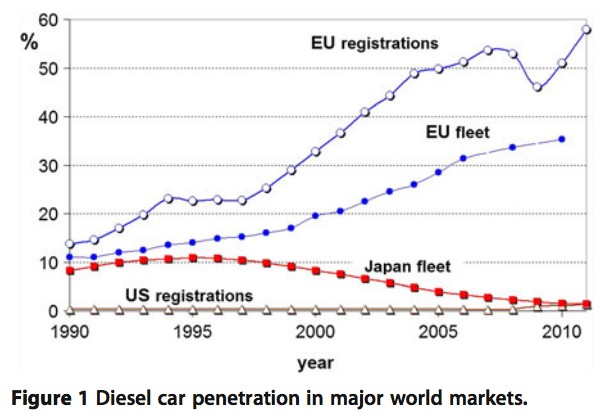Europe’s long-standing embrace of diesel vehicles, once touted as a green solution, has been fraught with unintended consequences. This article delves into the history of diesel’s popularity in Europe, examining the initial rationale, the environmental and health impacts, and the current shift away from this fuel source.
The Rise of Diesel in Europe: A Climate Change Solution Gone Wrong
In the 1990s, European governments incentivized diesel car purchases with tax breaks, aiming to reduce carbon dioxide emissions due to diesel engines’ higher fuel efficiency. This led to a significant increase in diesel car sales, reaching nearly 60% of new registrations by 2011.
However, this seemingly sensible strategy backfired spectacularly.
The Dark Side of Diesel: Air Pollution and Health Concerns
One major drawback of diesel engines is their higher emission of harmful air pollutants like nitrogen oxides (NOx) and particulate matter. These pollutants contribute to respiratory illnesses, cardiovascular problems, and premature deaths.
European regulators struggled to control these emissions, relying on weak testing procedures that allowed automakers to exploit loopholes. As a result, real-world diesel car emissions remained significantly higher than permitted, leading to persistent air quality issues in major European cities. Studies have linked this pollution to thousands of premature deaths annually.
A Questionable Climate Solution: Did Diesel Really Help?
Ironically, the climate benefits of diesel adoption have also been questioned. While diesel engines emit less CO2 than gasoline engines, they produce more black carbon, a potent contributor to global warming. Furthermore, lower diesel fuel taxes encouraged increased driving, offsetting some CO2 reductions.
A 2013 study suggested that the overall climate impact of Europe’s diesel boom might have been negligible, even potentially negative. This raises questions about the long-term effectiveness of prioritizing diesel over alternative technologies like hybrids or electric vehicles.
The Turning Tide: Europe’s Move Away from Diesel
The Volkswagen emissions scandal, coupled with growing awareness of diesel’s health and environmental impacts, has prompted a shift in European policy. Governments are reconsidering tax incentives for diesel, and stricter emission standards and on-road testing are being implemented. However, transitioning away from diesel presents challenges for European automakers heavily invested in this technology. The future likely lies in electric vehicles, but catching up to competitors who prioritized this technology earlier will require significant effort.
Lessons Learned: The Importance of Careful Energy Policy
Europe’s experience with diesel highlights the risks of betting heavily on a single energy solution without fully understanding its long-term consequences. It underscores the need for:
- Rigorous emission regulations and enforcement: Weak testing procedures can undermine even the most ambitious environmental policies.
- Considering a broader range of solutions: Focusing on a single technology can hinder the development and adoption of more sustainable alternatives.
- Focusing on outcomes rather than specific technologies: Policy should prioritize desired environmental and health outcomes rather than promoting specific industries.
Europe’s diesel saga serves as a cautionary tale for policymakers worldwide, emphasizing the importance of careful consideration and long-term planning in energy policy decisions.


